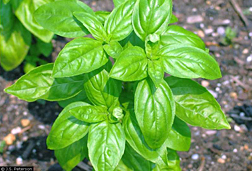This page has been archived and is being provided for reference purposes only. The page is no longer being updated, and therefore, links on the page may be invalid.
|
|
Boosting Basil in Mississippi
By Ann PerryApril 22, 2008
Fragrant basil fields are already part of the landscape in Europe, Asia and some parts of the United States. This aromatic herb provides a variety of essential oils which are used in foods, pharmaceuticals and cosmetics worldwide. Now Agricultural Research Service (ARS) chemist Charles Cantrell is helping to assess basil's potential for large-scale production in Mississippi.
Cantrell, in the ARS Natural Products Utilization Research Unit at Oxford, Miss., is partnering with Mississippi State University (MSU) horticulturalist Valtcho Jeliazkov to evaluate the chemical composition and field performance of 38 basil accessions.
The researchers obtained the sweet basil (Ocimum basilicum L.) from the ARS National Plant Germplasm Collection and cultivated the plants at the MSU Research and Extension Center at Verona, Miss. After the crops matured, they analyzed each accession for differences in chemical composition and yield.
The team found that the dry basil yields from all of the accessions were relatively high, with most exceeding 3,500 pounds per acre, and were generally consistent with yields reported from other countries. In addition, the accessions contained a range of different essential oil compositions and essential oil volumes. The Mississippi basil crops did not appear to be susceptible to insect pests that typically infest basil varieties grown in southeast Europe, which is a significant center of basil production
In another study of three different basil genotypes, the scientists harvested the crops three times--when the plants were in full bloom--during the growing season. They observed that harvest practices altered crop essential oil content, yield and composition. Sweet basil (O. basilicum L.) harvests yielded higher levels of essential oils and herbage after a second and third cut, while holy basil (O. sanctum L.) increased oil and herbage yields with the third cut.
In 2000, basil imports to the United States--either fresh, dried, or as essential oils--were valued at approximately $5.6 million. This research indicates that with the right startup support, Mississippi farmers could be positioned to produce a high-value crop for the national--and world--marketplace.
ARS is the U.S. Department of Agriculture's chief scientific research agency.

